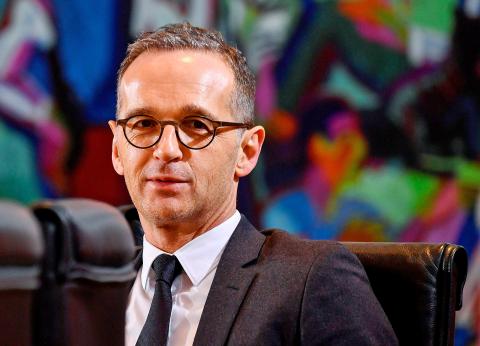German Minister of Foreign Affairs Heiko Maas on Wednesday last week voiced his opposition to China’s threat of using military force, making him the highest-ranking foreign official to speak out against Beijing’s Taiwan policy in several years.
Wong Ming-hsien (翁明賢), a professor at Tamkang University’s Graduate Institute of International Affairs and Strategic Studies, on Saturday said that Maas’ remarks are part of German efforts to counter China’s rise as the EU becomes increasingly aware of the problems resulting from Beijing’s growing influence in the world.
Maas made the remarks at the German Bundestag, after Germany-Taiwan Parliamentary Friendship Group Chairman Klaus-Peter Willsch, a Christian Democratic Union lawmaker, asked him about Chinese President Xi Jinping’s (習近平) Jan. 2 speech.

Photo: AFP
In an address in Beijing on the 40th anniversary of the “Message to Compatriots in Taiwan,” Xi said that he would not renounce the use of force against foreign forces and pro-Taiwanese independence “separatists” that interfere with China’s goal of peaceful unification as he announced plans to explore a Taiwanese version of the “one country, two systems” model.
The German government would make clear, as it has in the past, that it disagrees with Beijing’s threat of military force against Taiwan, Maas said.
China has at least once persuaded individual EU members to block proposals about Taiwan that have come before the Council of the EU’s Foreign Affairs Council, he said, adding that he hoped the EU would adopt majority rule, instead of requiring unanimity, and share Germany’s stance on issues related to Taiwan.
Germany has always believed in resolving cross-strait issues by peaceful means, German Minister for European Affairs Michael Roth said in a written response to the session.
Cross-strait dialogues should take place based on mutual respect, and the “status quo” should not be changed unless both sides agree, he added.
Commenting on Maas’ remarks, Wong said that China, in its rise, has been responsible for many problems worldwide, such as Beijing’s crackdowns on human rights in China’s Xinjiang Uighur Autonomous Region and Tibet, as well as alleged attempts to gather intelligence from other governments through Huawei Technologies Co.
Beijing’s “Made in China 2025” plan and Germany’s “Industry 4.0” plan are mutually exclusive, and although China is Germany’s third-biggest market, the German government would not allow their trading partnership to affect its foreign policies, he said.
Germany’s attempts to counter China’s rise can be in part attributed to efforts by the nation’s representative offices abroad, he said.
As Germany is a federal republic, the Taiwanese government should consider promoting Taiwan through enhanced civic exchanges with local governments in Germany, he added.

Chinese Nationalist Party (KMT) Chairman Eric Chu (朱立倫), spokeswoman Yang Chih-yu (楊智伃) and Legislator Hsieh Lung-chieh (謝龍介) would be summoned by police for questioning for leading an illegal assembly on Thursday evening last week, Minister of the Interior Liu Shyh-fang (劉世芳) said today. The three KMT officials led an assembly outside the Taipei City Prosecutors’ Office, a restricted area where public assembly is not allowed, protesting the questioning of several KMT staff and searches of KMT headquarters and offices in a recall petition forgery case. Chu, Yang and Hsieh are all suspected of contravening the Assembly and Parade Act (集會遊行法) by holding

PRAISE: Japanese visitor Takashi Kubota said the Taiwanese temple architecture images showcased in the AI Art Gallery were the most impressive displays he saw Taiwan does not have an official pavilion at the World Expo in Osaka, Japan, because of its diplomatic predicament, but the government-backed Tech World pavilion is drawing interest with its unique recreations of works by Taiwanese artists. The pavilion features an artificial intelligence (AI)-based art gallery showcasing works of famous Taiwanese artists from the Japanese colonial period using innovative technologies. Among its main simulated displays are Eastern gouache paintings by Chen Chin (陳進), Lin Yu-shan (林玉山) and Kuo Hsueh-hu (郭雪湖), who were the three young Taiwanese painters selected for the East Asian Painting exhibition in 1927. Gouache is a water-based

Taiwan would welcome the return of Honduras as a diplomatic ally if its next president decides to make such a move, Minister of Foreign Affairs Lin Chia-lung (林佳龍) said yesterday. “Of course, we would welcome Honduras if they want to restore diplomatic ties with Taiwan after their elections,” Lin said at a meeting of the legislature’s Foreign Affairs and National Defense Committee, when asked to comment on statements made by two of the three Honduran presidential candidates during the presidential campaign in the Central American country. Taiwan is paying close attention to the region as a whole in the wake of a

OFF-TARGET: More than 30,000 participants were expected to take part in the Games next month, but only 6,550 foreign and 19,400 Taiwanese athletes have registered Taipei city councilors yesterday blasted the organizers of next month’s World Masters Games over sudden timetable and venue changes, which they said have caused thousands of participants to back out of the international sporting event, among other organizational issues. They also cited visa delays and political interference by China as reasons many foreign athletes are requesting refunds for the event, to be held from May 17 to 30. Jointly organized by the Taipei and New Taipei City governments, the games have been rocked by numerous controversies since preparations began in 2020. Taipei City Councilor Lin Yen-feng (林延鳳) said yesterday that new measures by